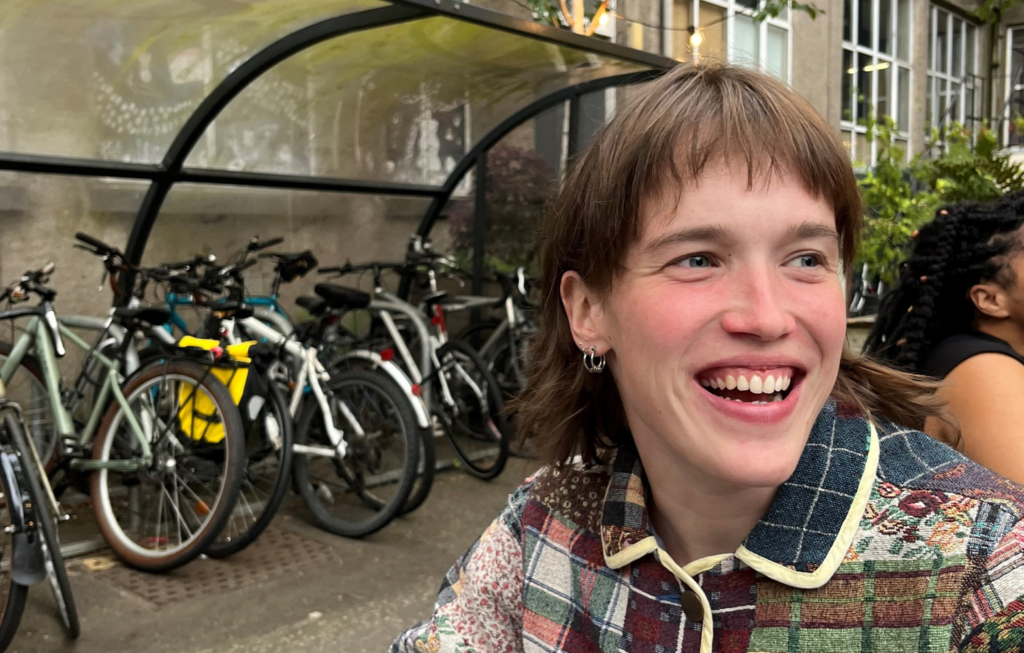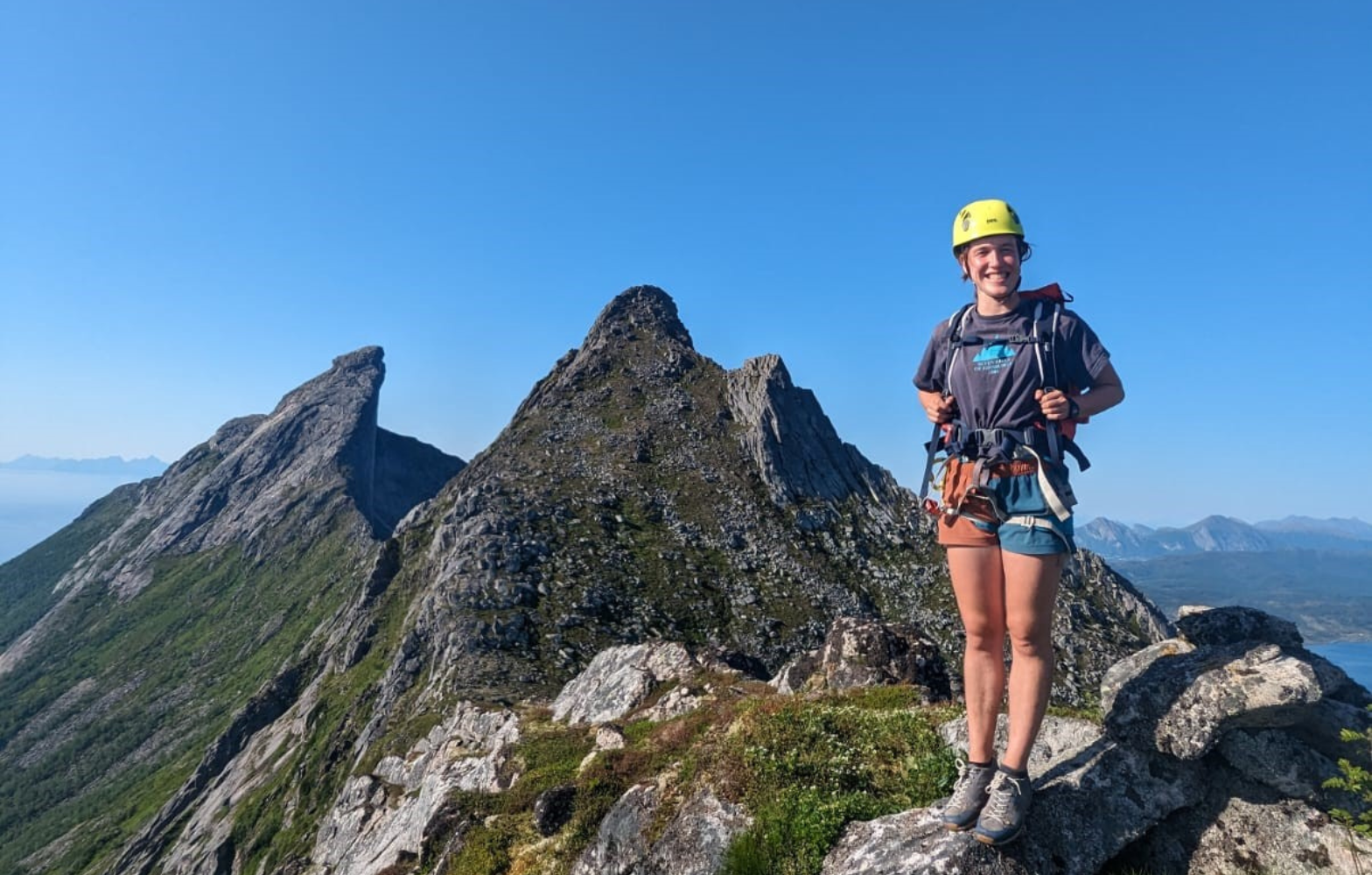Nina
It’s time for another of ‘Your Behçet’s Stories’. We recently heard from Nina who shared with us her experiences of having symptoms from a young age, as well as how illness within her family inspired her to pursue a career in medicine. Thank you so much to Nina for sharing your story with us.
We are looking for more participants for this series so if you would like to take part too, you’ll find the details at the bottom of the page.
Nina is a 23-year-old medical student living in Edinburgh. She spends as much of her time outdoors as she can, and is likely to be found swimming in the sea or in a tent.
When did you first experience symptoms of Behçet’s and how did you get diagnosed?
I started getting mouth ulcers at the age of 5/6. They’d last for weeks and would scar badly. It was often really hard to eat and I remember going in and out of the dental hospital as no one was really sure what was going on. I’d have periods of strange unexplainable illness and fatigue which meant I missed more school than my peers. In some ways I was lucky in that my younger sister was already being seen by a rheumatologist for lupus, and several other family members also have autoimmune conditions, so I got referred to rheumatology relatively quickly. It took years and an array of other symptoms (erythema nodosum and genital ulcers) before a diagnosis of Behçet’s was suggested when I was 13.
You mentioned to us you received good support for your Behçet’s as a child, but it’s been harder for you to access help as an adult. Would you like to tell us more about that and what has been difficult as an adult?
The rheumatology team at the Edinburgh Sick Kids knew me and my family really well. They’d known me from a young age, and I’d seen them frequently throughout when my sister was dying in 2009 and afterwards when I struggled with anorexia until my late teens. Amongst the turmoil of grief and living with a chronic illness, they were a constant who understood what was going on without explanation – I have particularly fond memories of some of the nurses. Transitioning from this to overstretched adult services was a massive shock. I really struggled to explain my family history to people and felt belittled when my symptoms weren’t taken seriously. As a medical student I really do understand the pressures on the NHS, but this almost made it worse as everything felt completely out of my control – my mental health and faith in my degree eroded.
You mentioned that you have struggled with the psychological impact of having Behçet’s, as well as having other family members with chronic illnesses. Would you like to tell us more about what it has been like for you and what you have found most difficult?
My sister Verity had lupus for most of her short life. She was the youngest person in Scotland to be diagnosed at that time, which meant that the symptoms of her cancer were missed under the shadow of autoimmunity. She died aged 8. We saw the same rheumatology team, although she saw them a lot more frequently than I did.
As a child, I didn’t really understand the extent of what was going on, and so didn’t really think that the overlap of our health affected me. But looking back, I think I felt a responsibility to seize the opportunities that Verity didn’t get to have, whilst also feeling guilty for not having experienced the degree of suffering that she did. It gave me a warped sensation of my own capabilities and also of the impact that Behçet’s was having on my life.
I spent years not feeling worthy of living and of receiving medical support.
Was it your family’s experiences of illness that inspired you to study medicine?
Almost certainly. I think if Verity was still alive today, or I didn’t have experience of a chronic illness, I would not have considered medicine as a career. In another life I’d be studying English Literature.
I’ve met some very inspiring doctors, but I’m also acutely aware of the responsibility of the profession, and that scares me. I know what it’s like to be the patient, the relative, and the healthcare worker, a position that is both a benefit and a curse. It’s so frustrating to see pressures on the NHS affect patients, whilst also being on the other end of them myself. It’s sometimes like fighting a losing battle.
I’ve really struggled with knowing whether medicine is the right degree for me – whether I chose it for the right reasons, and whether it’s a sustainable career for me to have. It can be demoralising to be in the current environment of the NHS, but I hold out hope with each positive interaction I have with patients and staff. I’m in a very privileged position to be studying medicine, and can only hope to use my experience of illness to help others for however long I stay in the profession.
How do you manage being a medical student alongside having Behçet’s? Do you have any advice for other students who have chronic illnesses?
Previously, I did not manage well at all. Fatigue has been the most prominent feature of Behçet’s for the last 3 years, but it took until this year to accept help for it whilst studying. I spent a year handing in deadlines late, barely attending lectures, constantly anxious and afraid of being called a fraud. The fatigue was so bad that for weeks at a time I could not leave my bed. It became so debilitating that I was forced to take a year out of uni. I felt like a failure, but it was actually one of the best decisions I’ve ever made. On my year out I had time to rest and take stock of what was happening, and I realised that I’d been trying to struggle through it all on my own.
As soon as I asked for help and started talking to those around me, things became much easier. If you need to take time out, take time out. We are not fixed in the position that we are in, life is in constant flux, and if you help yourself now, you will likely help yourself in the future too.
I was stuck in an ignorant cycle of worrying what other people would think of me, without considering what is was that I actually needed.
It’s so important to pace yourself and not feel guilty for resting or listening to your body.
Do you attend one of the NHS Behçet’s Centres of Excellence in England to see specialists there? If so, what has your experience of this been like? If not, have you ever tried to get a referral to a Centre of Excellence in England or have you not needed to?
I tried to get a referral to a Behçet’s Centre this year as I was feeling very alone in my experience of the disease. However, I did not meet the criteria from my local health board as I am not on biologic drugs. It’s frustrating that specific Behçet’s care is not available in Scotland – it’s an isolating condition even without being able to access specialised support.
You mentioned to us you have experienced doctors not taking your Behçet’s seriously, or some not having heard of it at all, which must be so frustrating. Would you like to tell us more about your experiences of this? Have you had any success in educating some doctors about the condition?
I’ve found that some people look at Behçet’s and think “oh you just get mouth ulcers and are tired sometimes”, whereas it’s so much more than that stereotype. You have Behçet’s for the rest of your life, but a health professional only sees an instance of this. I think the hardest thing is translating the entirety of the impact of Behçet’s into a short consultation. Some doctors just aren’t aware, or don’t have enough time for, the burden and extent of chronic disease.
I’d like to think that I take this into the way in which I approach medical school, and help encourage my peers as future doctors to look at each patient holistically.
When you’re not studying, what kinds of things do you enjoy doing? Do you have any particular hobbies and/or interests?
I’m lucky to live close to the sea, and find that sea swimming really helps to melt everything else away. I love literature, have read at poetry open mic nights, and just love being outside.
What things do you find the most helpful in terms of support?
I have lovely, lovely friends who have really been a godsend. I’d like to access support groups as I have never met another person with Behçet’s before.
Do you have any tips for those who have been diagnosed with Behçet’s?
Speak to those around you. Don’t tell yourself that you are your condition. You are still who you are, and those who love you know that better than anyone.
Thank you to Nina for answering our questions!
Interview published 20/09/23
Could your story help others?
We would like to share your personal experiences of diagnosis and living with Behçet’s, and we’d like to hear from a wide variety of patients, of all ages and backgrounds. We’d also like to hear from carers and/or family members of those affected by the condition.
If you’re a patient you might have some useful tips for managing your condition day-to-day that you would like to share to help others, or you might like to tell us your story of diagnosis, or about how your Behçet’s has changed your lifestyle or your work life. If you’re a carer or family member of someone affected by Behçet’s, you might wish to share your personal experiences of caring for someone with a rare condition.You can share as much or as little as you want with us.
If you are interested in taking part and would like to know more please email Deborah at info@behcetsuk.org
We look forward to hearing from you!


